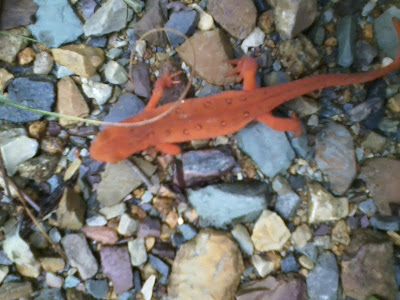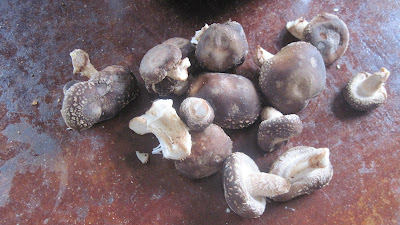With deadlines piled high, I decided I should stay home to knock off a few on Friday. Phooey! My publisher can't seem to make its payments on time, so why should I plan my life around its deadlines? I packed in a quick morning run, pulled on some decent "casual" clothes, and drove toward a sustainable agriculture symposium sponsored by the Washington & Lee School of Law's Journal of Energy, Climate and the Environment.
Judith McGeary, of the U.S. Farm and Ranch Freedom Alliance, a Texas lawyer and farmer, compared "industrial" to "sustainable" farming. Industrial farming takes a linear, additive approach focused on NPK (nitrogen, phosphorus, potassium) and the greatest quantity of food at the cheapest (short-term) cost. Sustainable farming seeks synergies in a holistic approach aimed at nutrient-dense food good for consumers, the environment, the farm, and labor. Industrial farming is energy-intensive, oil dependent, and controlled by a few corporations. Sustainable farming promotes social justice, human rights and animal welfare.
She then turned to food safety, where the greatest clash occurs between industrial and sustainable farming. Industrial farming, focused on maximizing profits, is the great consolidator, commingling food through long, complex supply chains. Finding the source of a contaminant, such as the cause of the recent spinach scare, is difficult because the produce of many farmers was commingled and then distributed under 34 different brand names shipped all over the country. Sustainable farming, on the other hand, has a completely different management system, with a much smaller scale. When/if problems arise, fewer people get sick because it takes days instead of months to track down the issue.
The major regulatory problem is "scaleability." Agricultural regulations are aimed at large-scale producers and based on industrial production. Requiring a giant monocultural producer to develop and monitor a 30-40 page procedural manual on spinach production for its 10,000 acres may make sense. Requiring a 30-40 page manual for each of the 100 varieties of vegetables grown on a 5-acre farm does not make sense. The typical approach taken by sustainable farm organizations to this sort of regulation is to seek an exemption for small, local, cottage food producers.
Ms. McGeary asked a number of questions:
- Who decides whether consumers should take the risks involved in food production? Consumers, regulators, judges, farmers?
- What's the role of victims? Is it fair to let decisions be driven by victims' groups?
- Is food a business like any other? Does the market system work well with food? Is food production unique in its dependence on "good" or "bad" weather? Does the market system properly account for positive "externalities" (such as less reliance on foreign oil or superior soil development)? Does the market system work if consumers don't understand the risks involved in use of a product (such as GMO -- genetically modified -- foods)?
- Is an undefined label such as "natural" useful?
The other speaker was Joel Salatin, the internationally renown "beyond organic" farmer. For a good read, try his book "The Sheer Ecstacy of Being a a Lunatic Farmer." He said Ms. McGeary hit the nail on the head when she identified the primary issue as one of scaleability, and launched into a series of colorful examples from his life as a farmer near Staunton, Virginia. You can read about these in his books. Don't miss this fabulous speaker when he visits your area. You may not agree with his libertarian politics, but this entertainer speaks with authority, humor, and flash.
He mentioned the Capitol Hill testimony of a senior USDA ("US-duh" in Mr. Salatin's vocabulary) manager (maybe an assistant secretary), who bragged about how the elimination of a multitude of small local food processors (abattoirs) enabled US-duh inspectors to markedly increase the number of products they could inspect in one day. This was an AHA-moment for Mr. Salatin: in a country that worships efficiency, why not expect its government to worship efficiency too?
He pointed out that our culture has not had a good record when it comes to dealing with the lunatic fringe.
Mr. Salatin turned to four remedies that may be available to deal with the regulatory inflexibility and unscaleability:
- By "commerce." Designing food production so it is not involved in "commerce." Here he threw in his famous observation that you can give food away and be admired as a philanthropist, but charge a dollar and you might as well be selling cocaine.
- By "definition." For example, selling raw milk as "bath milk" or "pet milk." He told the story of a small producer who sold cheese at a local farmers' market. After an inspection of her "facility," she researched State laws and discovered that fish food seemed to be the least regulated food. She called the appropriate state employee and confirmed that there were no restrictions on fish food. So she began to sell "fish-food Colby" and "fish-food Swiss" and the regulators couldn't touch her.
- By "substitution." He offered the example of a farmer who packaged gallons of manure and sold them for $8 each. Buy the manure and you can get a gallon of raw milk for free.
- By "waiver." Calling this remedy "unexplored" and ineffective in States like Virginia, he suggested having consumers sign waivers taking full responsibility for the risks they assume when buying food.
"What can we do?" asked one of the law students in attendance. Mr. Salatin suggested, "Begin to participate in the food system you want to see. The beginning of attorney scruples is consistency of life."
Asked to predict 20 years in the future, both speakers declined. Mr. Salatin quoted someone (I missed the reference): "If we keep going the way we're going we'll end up where we're headed."


























